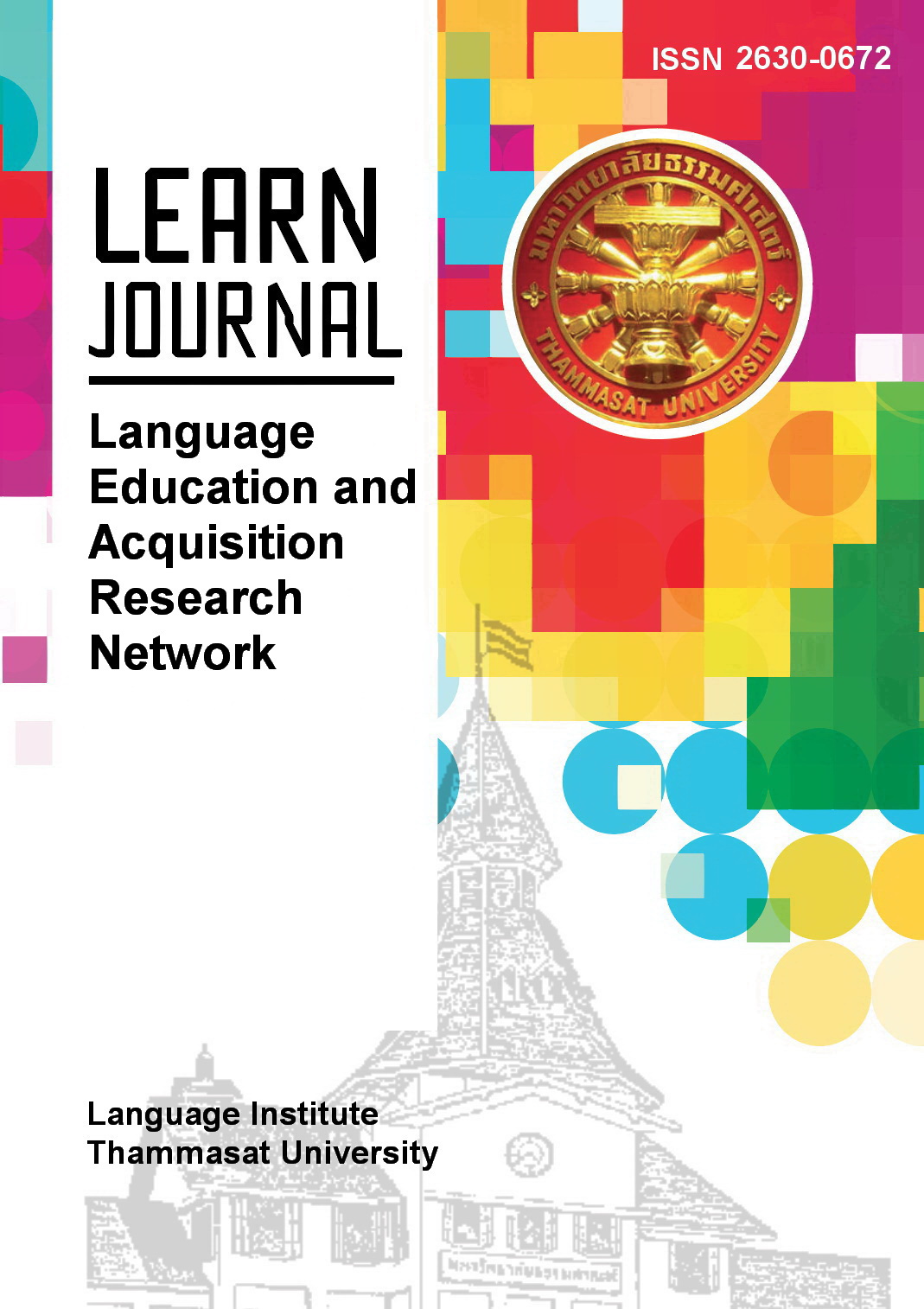Assessing the English Writing Needs of Undergraduate Business Administration Students for ESP Writing Course Development: A Case Study in Thailand
Main Article Content
Abstract
In developing an ESP writing course to prepare business administration students for business careers, it is essential to identify their English writing needs. Thus, this study aims to explore the English writing needs of Thai undergraduate business administration students as an initial step of ESP writing course development, highlighting four areas: their perceived writing abilities, writing challenges, required writing skills, and learning preferences. This study employed an interpretivist approach with a qualitative design, drawing on data from semi-structured interviews with 12 business administration students and 16 stakeholders, including employers, employees, entrepreneurs, ESP lecturers, and business lecturers. The findings reflect the learning experiences and insufficient English writing abilities of business administration students and graduates with problematic areas in grammar and vocabulary. In addition, they typically have problems with writing emails and reports. Specifically, three English writing skills were identified as required skills for business administration personnel, namely the skills to write emails providing information, e-commerce product descriptions, and progress reports. Student preferences for business vocabulary and communication expressions, teacher feedback, and a positive learning environment were revealed. This study offers educators and course designers valuable insights into the English writing needs of Thai business administration students for ESP course development.
Article Details
References
Aboudan, R. (2009). Laugh and learn: Humor and learning a second language. International Journal of Arts and Sciences, 3(3), 90-99.
Asyiah, D. N. (2017). The vocabulary teaching and vocabulary learning: perception, strategies, and influences on students' vocabulary mastery. Jurnal Bahasa Lingua Scientia, 9(2), 293-318. https://doi.org/10.21274/ls.v9i2.701
Atique, S. S., & Khan, I. (2015). The writing needs of business students: A teacher’s perception in an EFL context. Journal of Education and Social Sciences, 3(2), 231-244.
Boonteerarak, P. (2021). The development of a communicative English training curriculum for Thai counter clerks in convenience stores. LEARN Journal: Language Education and Acquisition Research Network, 14(2), 115-142.
Boonyarattanasoontorn, P. (2017). An investigation of Thai students’ English language writing difficulties and their use of writing strategies. Journal of Advanced Research in Social Sciences and Humanities, 2(2), 111-118. https://dx.doi.org/10.26500/JARSSH-02-2017-0205
Braun, V., & Clarke, V. (2006). Using thematic analysis in psychology. Qualitative Research in Psychology, 3(2), 77-101. https://doi.org/10.1191/1478088706qp063oa
Changpueng, P. (2012). The effects of the genre-based approach on engineering students’ writing ability. LEARN Journal: Language Education and Acquisition Research Network, 5, 1-18.
Cheep-Aranai, R., Chutichaiwirath, K., Grubbs, S., & Brady, M. (2017). A comparison of industry English needs with university students' strengths. Veridian E-Journal, 10(4), 394-409.
Dudley-Evans, T., & St. John, M. J. (1998). Developments in English for specific purposes: A multi-disciplinary approach. Cambridge University Press.
Dueraman, B. (2015). The crucial point in time where Thai students are introduced English language writing. English Language Teaching, 8(9), 96-103. http://dx.doi.org/10.5539/elt.v8n9p96
Education Testing Services. (2021). TOEFL iBT® Test and score data summary 2020. https://origin-www.ets.org/s/toefl/pdf/toefl_tsds
_data_2020.pdf
Grami, M. (2005). The effect of teachers’ written feedback on ESL students’ perception: A study in a Saudi ESL university-level context. Annual Review of Education, Communication and Language Sciences, 2(1), 10-13.
Graves, K. (2000). Designing language courses: A guide for teachers. Heinle and Heinle Publishers.
Heckadon, P., & Tuzlukova, V. (2021). Becoming a business writer: Omani ESP students' self-perceived writing challenges, needs and wants. Journal of Teaching English for Specific and Academic Purposes, 9(4), 753-764. https://doi.org/10.22190/JTESAP2104753H
Hiranburana, K. (2017). Use of English in the Thai workplace. Kasetsart Journal of Social Sciences, 38(1), 31-38. https://doi.org/10.1016/j.kjss.2015.10.002
Hutchinson, T., & Waters, A. (1987). English for specific purposes. Cambridge University Press.
Kawinvasin, S., Lertchalermtipakoon, P., Pochote, S., & Chinorak, V. (2021). Using genre awareness to enhance business email correspondence among EFL students. Liberal Arts Review, 16(1), 45-58.
Khan, M. A., & Khan, M. R. (2015). An ESP pre-service extensive writing course for the young Pakistanis opting for banking as a future profession. International Journal of Language and Linguistics, 2(5), 101-112.
Khruawan, M., Khaourai, P., Sangthakeong, A., & Chanpermpoonpaul, S. (2021). English business email writing problems of 4th year logistics and supply chain management students of the Faculty of Business Administration at Huachiew Chalermprakiet University. Liberal Arts Review, 16(1), 59-69.
Low, P. (2020). An investigation of English usage in careers of Thai graduates with a business administration degree. Shanlax International Journal of Education, 9(1), 27-32. https://doi.org/10.34293/education.v9i1.3416
Moses, R. N., & Mohamad, M. (2019). Challenges faced by students and teachers on writing skills in ESL contexts: A literature review. Creative Education, 10(13), 3385-3391. https://doi.org/10.4236/ce.2019.1013260
Office of Small and Medium Enterprises Promotion. (2019). Executive summary: White paper on SME 2019. https://www.sme.go.th/ upload/mod_download/download-20190919092631.pdf
Pimthong, S., Chumpavan, S., & Suksaeresup, N. (2019). Email writing problems and strategies used to solve the problems by Thai employees communicating with native and non-native English speakers in an international workplace. Manutsat Paritat: Journal of Humanities, 39(2). 139-152.
Polsombat, P. (2015). Needs analysis of business English for the sales division at a Japanese trading company in Thailand [Master’s thesis, Thammasat University]. Thammasat University E-Theses.
Rimkeeratikul, S. (2022). Needs analysis on an English textbook entitled English for international business. LEARN Journal: Language Education and Acquisition Research Network, 15(1), 748-774.
Thanh, N. C., & Thanh, T. T. (2015). The interconnection between interpretivist paradigm and qualitative methods in education. American Journal of Educational Science, 1(2), 24-27.
Thitthongkam, T., Walsh, J., & Bunchapattanasakda, C. (2011). The roles of foreign language in business administration. Journal of Management Research, 3(1), 1-15.
Tian, L., & Li, L. (2018). Chinese EFL learners’ perception of peer oral and written feedback as providers, receivers and observers. Language Awareness, 27(4), 312-330. https://doi.org/10.1080/09658416.2018.1535602
Wu, Y. (2012). An empirical study on needs analysis of college business English course. International Education Studies, 5(2), 216-221. https://doi.org/10.5539/ies.v5n2p216
Zacharias, N. T. (2007). Teacher and student attitudes toward teacher feedback. RELC Journal, 38(1), 38-52. https://doi.org/10.1177/0033688206076157


